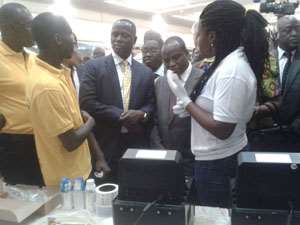
Emmanuel Kofi Armah Buah, Minister of Energy and Petroleum being briefed about how the PPMS works.
The National Petroleum Authority (NPA) has introduced a Petroleum Product Marking Scheme (PPMS) to combat the adulteration of fuel in the country.
The objective of the marking scheme is to enable the NPA, the regulatory body, monitor the quality of petroleum products, as well as recover fiscal tax revenue from the sale of these products.
Moses Asaga, Chief Executive Officer of NPA, who was speaking at the launch of the scheme yesterday in Accra, said the PPMS concept was a novelty aimed at ensuring that subsidized petroleum products reach the target group.
He said the scheme will help recover revenue, which would have been lost through the diversion of subsided petroleum products, adding that the implementation of the scheme would further ensure that consumers get clean and unadulterated fuel.
The concept of petroleum product marking involves the introduction of a bio-chemical liquid (fuel marker) into the petroleum products at the loading depots prior to delivery of the products to the retail outlets, he said.
He said the marker creates a 'finger print' and provides a secure, tamper-proof method of authentication.
Mr Asaga said punitive sanctions such as fines, imprisonment or both shall be applied against those caught diluting petroleum products.
The PPMS has been on trial since February 2013.
'Between May and June 2013, we undertook an evaluation exercise to ascertain the extent of permeation of the marking chemical.
He said out of the 2,700 retail outlets operating in the country, there was a record violation of more than 32 percent among some 1,000 stations that were sampled.
'This violation translates into revenue loss in excess of GH¢50 million through diversion of subsidized petroleum products,' Asaga said.
He said in the follow up exercise in September 2013, the violation reduced from 32 percent to 7 percent, indicating the effectiveness of the programme.
'We are confident that the full implement would yield even better results,' he said.
By Cephas Larbi




 Minority will expose the beneficial owners of SML, recover funds paid to company...
Minority will expose the beneficial owners of SML, recover funds paid to company...
 Prof. Opoku-Agyemang has ‘decapitated’ the NPP’s strategies; don’t take them ser...
Prof. Opoku-Agyemang has ‘decapitated’ the NPP’s strategies; don’t take them ser...
 Abubakar Tahiru: Ghanaian environmental activist sets world record by hugging 1,...
Abubakar Tahiru: Ghanaian environmental activist sets world record by hugging 1,...
 Prof. Naana Opoku-Agyemang will serve you with dignity, courage, and integrity a...
Prof. Naana Opoku-Agyemang will serve you with dignity, courage, and integrity a...
 Rectify salary anomalies to reduce tension and possible strike action in public ...
Rectify salary anomalies to reduce tension and possible strike action in public ...
 Stop all projects and fix ‘dumsor’ — Professor Charles Marfo to Akufo-Addo
Stop all projects and fix ‘dumsor’ — Professor Charles Marfo to Akufo-Addo
 Blue and white painted schools will attract dirt shortly – Kofi Asare
Blue and white painted schools will attract dirt shortly – Kofi Asare
 I endorse cost-sharing for free SHS, we should prioritise to know who can pay - ...
I endorse cost-sharing for free SHS, we should prioritise to know who can pay - ...
 See the four arsonists who petrol-bombed Labone-based CMG
See the four arsonists who petrol-bombed Labone-based CMG
 Mahama coming back because Akufo-Addo has failed, he hasn't performed more than ...
Mahama coming back because Akufo-Addo has failed, he hasn't performed more than ...
